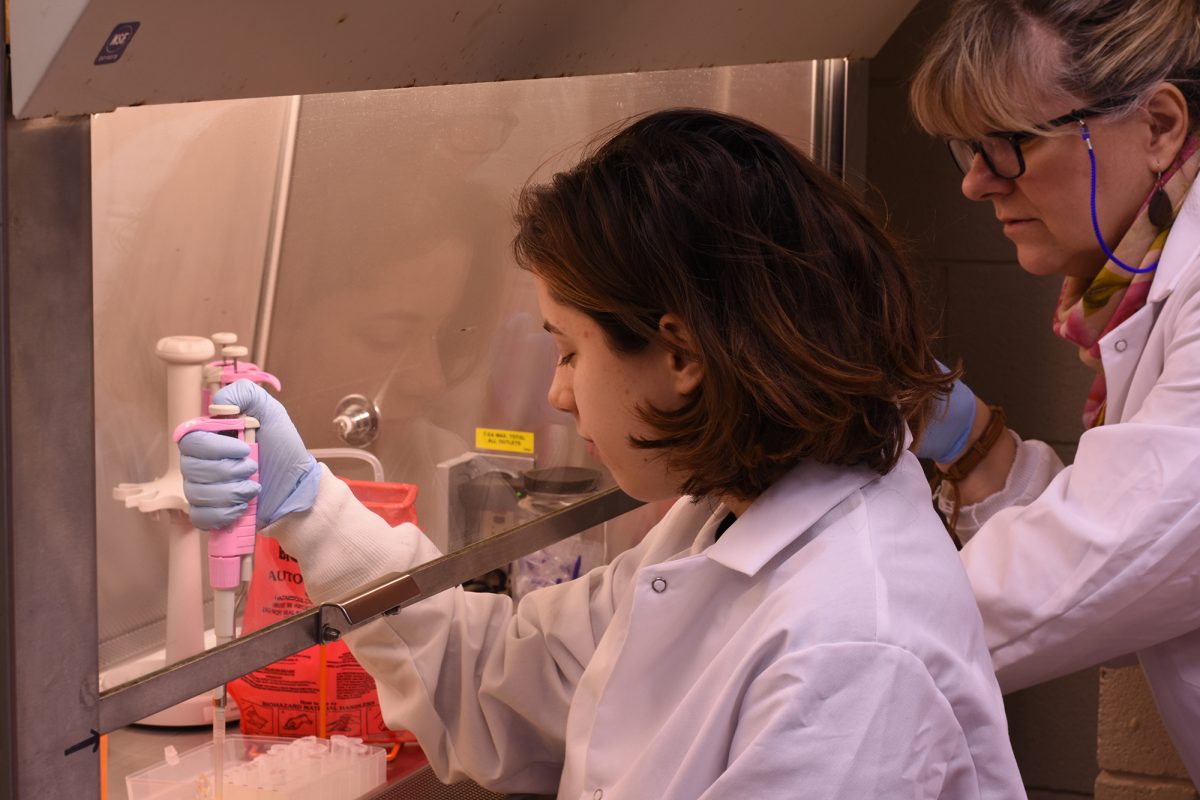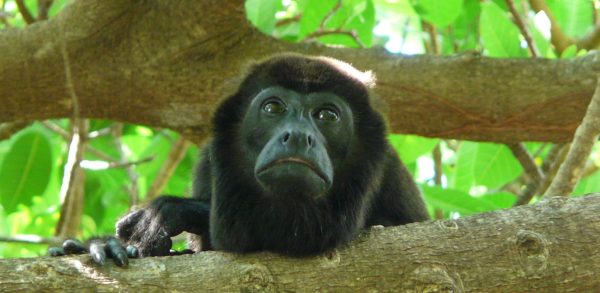
Courtesy of Lisa Corewyn
From left, Ashley Stacey '20 and Lisa Corewyn, associate professor in the Department of Biology, in 2018 doing ongoing research of mantled howler monkeys.
Lisa Corewyn, associate professor in the Department of Biology and coordinator of the anthropology minor at Ithaca College, and Kari Brossard Stoos, microbiologist and associate professor in the Department of Health Sciences and Public Health, are studying a population of mantled howler monkeys. They, along with students from Corewyn’s research lab, are investigating why the population of monkeys is declining by genotyping fecal samples and analyzing that data. This knowledge could then be applied to other wildlife to stabilize the decline of endangered species.
A method the researchers are using to investigate is genotyping, which involves studying the genetic makeup of an individual and analyzing that DNA. Mantled howler monkeys are classified as an endangered species and are commonly found in Central and South America, among other locations. Corewyn said this species of monkey has held pretty well against human development and that its decreasing numbers serve as an indicator that something may be wrong.
Brossard Stoos said via email that she is working with Corewyn to examine the spread of antimicrobial resistance among gut bacteria in wildlife. She said the presence of resistant bacteria could mean human intrusion into wild spaces, which Brossard Stoos said would point to a greater need for conservation.
Junior Brianna Jankowski, a health science major working with Corewyn, said she hopes appropriate action is taken if the data indicates a solution for the monkeys. This could include efforts to limit deforestation or to build corridors so the population expands. Corewyn said this would broaden the monkeys’ biodiversity.
“I think that maybe some kind of implementation of laws could be done,” Jankowski said. “That’s obviously a super big picture, and this is a smaller research product project, but it’s all to go toward the greater cause.”
Corewyn said she has studied this population in Hacienda La Pacifica, Costa Rica, since 2009. She said these monkeys face little hunting and habitat loss, allowing her to isolate other factors and better understand what is causing the decline.
“There isn’t just gonna be one thing [causing decline] — that one smoking gun and that’s it — and we can just fix it,” Corewyn said. “We’re looking at all these different things, like the genetic structure of the population, that will give us clues into potentially what other things are factoring in.”

Corewyn said that as long as protocols are followed and the fecal samples used to genotype the monkeys are stored correctly, she and her students can sample the fecal matter collected from the field for a very long time. Corewyn said they currently have around 300 samples in the freezer.
Corewyn said she and student researchers genotype individual monkeys by using microsatellites, which are tracts of repetitive DNA located within an organism’s genome. They extract DNA from the sample, then run that DNA through a polymerase chain reaction. Shortly after, Corewyn and her team take the data from the PCR to Cornell’s Genomics Facility for sequencing. They then plug what they found into a computer software program, which allows them to read alleles and genes using bioinformatics to understand that information.
Corewyn said climate change is a major factor in the population decline of mantled howler monkeys. According to the Center for Climate and Energy Solutions, climate change causes droughts, which alter the wet and dry seasons that Corewyn said the monkeys are used to.
Corewyn said another problem many species face is a lack of room to move around due to habitat loss, which can cause decreased biodiversity within a species. Anthropogenic barriers often consist of man-made structures, like roads and highways, that cut through ecosystems.
“A really important part of a species in their survival is having enough genetic diversity to maintain the species,” Corewyn said. “So, we are using that laboratory information to understand what the genetic structure of this population is. In other words, is it a largely inbred population? … And when we know that, there might be things we can actually do.”
Corewyn’s lab research on mantled howler monkeys requires permits and funding, as do other methods to help endangered species, like building corridors. Corewyn said that obtaining permits that allow her to conduct wildlife research and collect biological samples is both time-consuming and complicated, as is getting funding. This is because of the extensive paperwork process. Corewyn said via email that any significant funding available in the U.S. for a project such as the mantled howler monkey research would only be possible through grants from the National Science Foundation. Corewyn said the NSF was hit hard with recent budget cuts. According to ScienceInsider, NSF has awarded almost 50% fewer grants since Trump took office.
Corewyn said she and her team of researchers used to go to the site in Costa Rica every summer to study, but they have not been able to travel to Costa Rica since 2022 because of the funding and permitting process. Other practical research opportunities in the United States could be limited due to cuts to federal research, and disrupt ongoing projects.
“Now, with our regulatory agencies, we can’t import fecal samples without CDC permits,” Corewyn said. “The CDC might be disbanded under the current administration, so those are all threats to the kind of work we do.”
Corewyn said there may be a lack of opportunities for her students in the future if they go into research fields.
“We can’t even apply for a National Science Foundation grant to fund our work,” Corewyn said. “Not only is it a loss for our work and the research we do and our understanding of primary populations, it also reduces opportunities for students to learn. That’s hands-on learning. This is a rare hands-on learning opportunity that students can’t get just anywhere.”
Senior biology major Leo Iandolo said that researching with Corewyn is teaching him safety procedures and how to use PCR machines. Iandolo said these skills will help prepare him for his future work.
“Learning how to use different machines is always helpful because you might use something similar in the future,” Corewyn said. “Being able to get comfortable with [the machines] quickly so that you don’t worry too much about them [is helpful] because the more you worry, the worse things get. And if you can comfortably work with different things, even if it’s the first [or] second time, it makes it a lot easier.”
Corewyn said it is vital for people to be aware of the diminishing biological diversity in the world.
“It’s really important that we take responsibility and better understand the world around us so that it’s there for future generations,” Corewyn said. “[The monkeys] don’t need us, but we need them. We definitely need them. And that’s a message that gets lost in our everyday life. … What’s going on in this world is pretty important.”